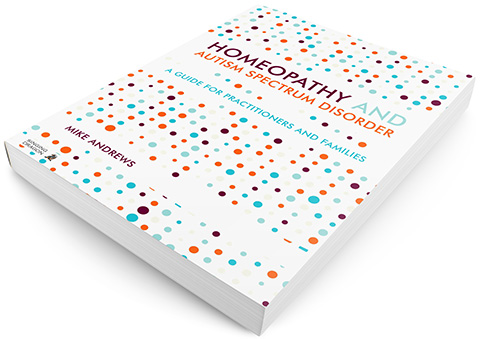
Autism Book
Homeopathy & Autism Spectrum Disorder: a guide for practitioners and families
Published by Singing Dragon – Jessica Kingsley Publishers 2014
Contents Homeopathy and ASD:
Preface.
Chapter 1. Can more be done to treat autism spectrum disorder (ASD)?
Chapter 2. What is ASD?
Chapter 3. Homeopathy and ASD around the world.
Chapter 4. Conversations with homeopaths.
Chapter 5. The holistic approach. Linlee Jordan, Director, Harbord Homeopathic Children’s Clinic, Australia.
Chapter 6. Autism or autisming?. Simon Taffler, private practice, London, UK.
Chapter 7. Asking questions and managing expectations.
Chapter 8. Working with others.
Chapter 9. The most commonly indicated homeopathic treatment strategies.
Chapter 10. Research and professional recognition.
Chapter 11. How homeopathy enhances the gift of ASD.
Glossary.
Reviews
Hilary Fairclough RSHom
I really enjoyed your book on autism – I learned a lot and think it is a fantastic resource for us homeopaths to dip into and for parents of children with autism. I particularly like the way you included other homeopaths’ experiences and perspectives.
Danish Society of Homeopaths
Homeopathy and Autism Spectrum Disorder. A Guide for Practitioners and Families.
Author: Mike Andrews
Singing Dragon 2014, Paperback, Pp 208, £, ISBN 978 – 1 84819 – 169 – 6
Reviewed by Charlotte Yde
Autism spectrum disorders (ASD) are gaining in numbers worldwide and this book shows how homeopathy has a lot to offer in managing behavior, improving physical health and overall wellbeing. To gain a thorough insight into the background of ASD and to read about other homeopaths’ experiences was a real treat for me.
The book is meant to be a guide both for practitioners and families, and the chapters are written so that homeopaths find useful information and parents/carers gain insight into the world of homeopathy, or vice versa, which is a brilliant way to underpin the importance of the therapeutic relationship.
The book starts with an introduction and assessment from a homeopathic point of view of the various treatment strategies that are being used in the UK and many other countries; behavior modification, conventional pharmaceutical drugs and dietary approaches.
Then there follows a chapter on background information about ASD; what does this diagnosis mean, how widespread is it? Causative factors are linked to the homeopathic theory of susceptibility. At the end of the chapter there is a useful list of rubrics for homeopaths who want to treat children with autism.
An inspiring part of the book mentions clinical results from the literature worldwide and presents interviews with 4 homeopaths; Carol Boyce, Phlippa Fibert, Dr. M.A. Rajalakshmi and Danny Dushan Ron, explaining their views on ASD and homeopathy. Linlee Jordan lets us meet some of her ASD patients and their families through small well explained case stories. This chapter also has a list for parents about how to get the most out of homeopathic treatment for their children and recommends a few self-help remedies to help with inflammation. I wondered if a parent/carer would have liked more of this type of information. Simon Taffler explains about his method and how he connects with the child. Causation, obstacles to cure and maintaining causes in relation to working with an ASD child are also mentioned.
A whole chapter is dedicated to the expectations of the homeopath and the parents/carer. For homeopaths this chapter is particularly useful before starting up with ASD patients. The many tips may form the basis for a future thriving therapeutic relationship. I used this chapter to reflect on some of my own ASD cases.
I appreciated the way this book linked the philosophy and the background information with openness to the surrounding society. The detailed index makes the book easy to use in daily practice, and I recommend the book for everyone with an interest in the autism spectrum disorder.
Amazon.co.uk reviews
Essential for those dealing with ASD By Celia Wendy Gaºgil on 23 Aug 2014
Format: Paperback
Full of scientific information but readily readable for the layman, this book strongly encourages further study of homeopathy. Mutliple case studies provide fascinating evidence of the effectiveness of this alternative therapy, while the dedication and humanity of its practitioners shines through the text. A very valuable contribution to the treatment of a disorder of the 21st century.
This is an excellent guide for homeopaths on how to treat autism By Sarah Dada on 4 Aug 2014
Format: Paperback
This is an excellent guide for homeopaths on how to treat autism. A lot of useful rubrics are making the diagnosis easy and facilitates homeopaths to find the correct remedy tailored to the specific needs of each individual patient with autism. Mike has put a lot of research in this and his book can be recommended to anyone who is interested in how to treat autism in a natural way.
Similia The Australian Journal of Homoeopathic Medicine
December 2015 Volume 27 No2 Reviewed by Philip Bailey
In all this is a very useful and informative book for parents of children with Autism Spectrum Disorder. It provides a detailed and well-written overview of the condition and how homeopathy can be used to treat it. An excellent introduction to homeopathy for parents of ASD children.